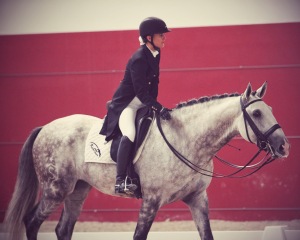It is great to come out everyday with a goal, an idea of what you would like to achieve.
It is also great to have a long term vision, a set of objectives with set times frames.
However, I read a quote recently that said “Peace Begins when Expectation Ends”, and I realise the importance of this truth in dressage training.
“Peace Begins when Expectation Ends” (unknown author)
It is great to set high expectations for yourself and for your horse, but if by chance you fall short of those ideals, often we are over critical or even a little harsh on ourselves afterwards.
If I come out for training and decide that today I am going to fix my position, then perhaps I am expecting too much and thus setting myself up to fail.
If however I come out and say today I will work on getting more relaxation in my legs, then it is more likely that my expectation will be met, and that tomorrow I can work on a different aspect.
If I decide today I am going to do the whole test perfectly, again I’m over shooting. If I select two or three movements of the test, and work on perfecting them, then I have more chance of a satisfied ride and a less confused and tired horse.
I have often heard people coming back after injury, or bringing their horse back after injury, saying things like “But I was expecting to be here by this date, so I’m going to have to push it.”
Expectations with deadlines are super, but setbacks are a natural and very real part of dressage training, and the ability to adjust your expectations, is just as important as your ability to set them in the first place.
I had expectations of where I wanted to be and when, but after the decision to geld my horses I had to rearrange my goals in order to give myself, and my horse time to recover and adjust.
If we set too much of our goals in concrete, we set ourselves up for disappointment, but if we make goals, understanding that they must remain flexible, we allow ourselves and our horses the opportunity to be in the moment.
Don’t end all expectation, but allow yourself the peace that comes from the ability to adjust them every now and then according to where you are on your journey.









 He also knows that if he tries to show off, and earn my reward through over exuberance, that he will also not be fully rewarded, because I know him, and I know when he is just trying to get me to tell him he is awesome, and when actually he is trying to take over!
He also knows that if he tries to show off, and earn my reward through over exuberance, that he will also not be fully rewarded, because I know him, and I know when he is just trying to get me to tell him he is awesome, and when actually he is trying to take over!


 Mum taught me from a very young age that if you didn’t do the stuff yourself, you didn’t go out of home, and so I learnt the ins and outs of grooming, feeding, mucking out, cleaning, clipping, lunging, brushing, etc, etc, etc, the list goes on.
Mum taught me from a very young age that if you didn’t do the stuff yourself, you didn’t go out of home, and so I learnt the ins and outs of grooming, feeding, mucking out, cleaning, clipping, lunging, brushing, etc, etc, etc, the list goes on.


 Riding everyday now I have constant pain that won’t go, and that I have learned to work around.
Riding everyday now I have constant pain that won’t go, and that I have learned to work around. Training ourselves to start each day fresh, each moment, each feeling, each thought, takes a lot of practice, and isn’t something that just happens.
Training ourselves to start each day fresh, each moment, each feeling, each thought, takes a lot of practice, and isn’t something that just happens.




 People are different to animals, and no matter how much faith you put in them they can let you down and you them.
People are different to animals, and no matter how much faith you put in them they can let you down and you them.